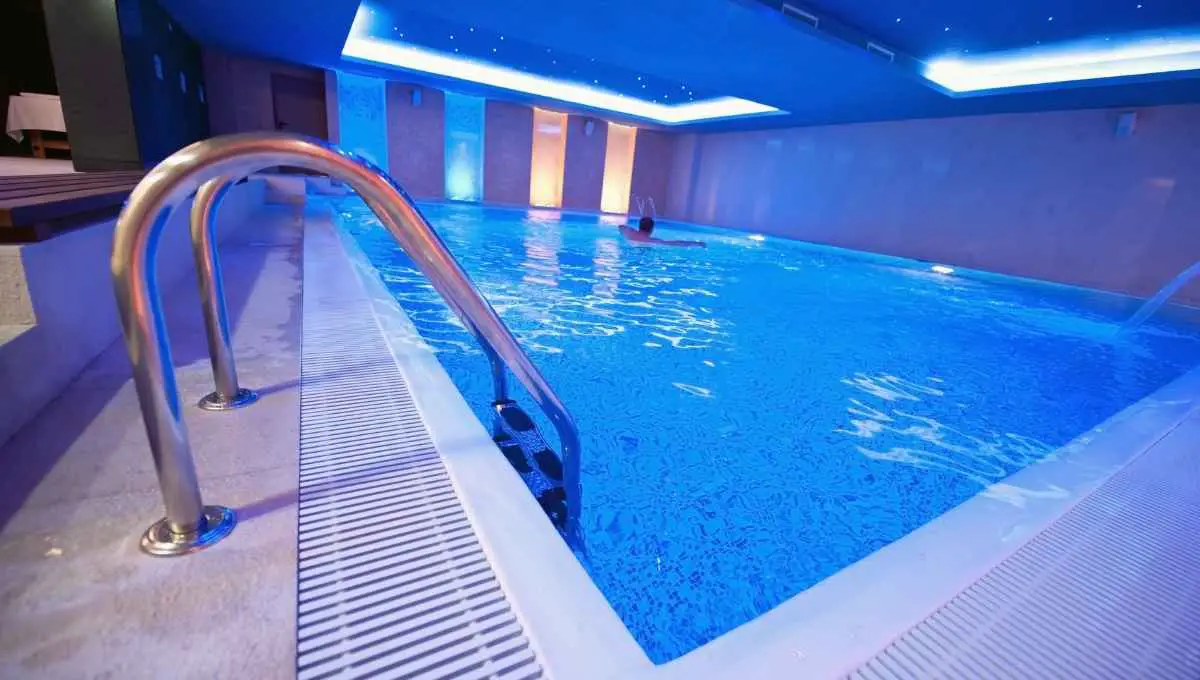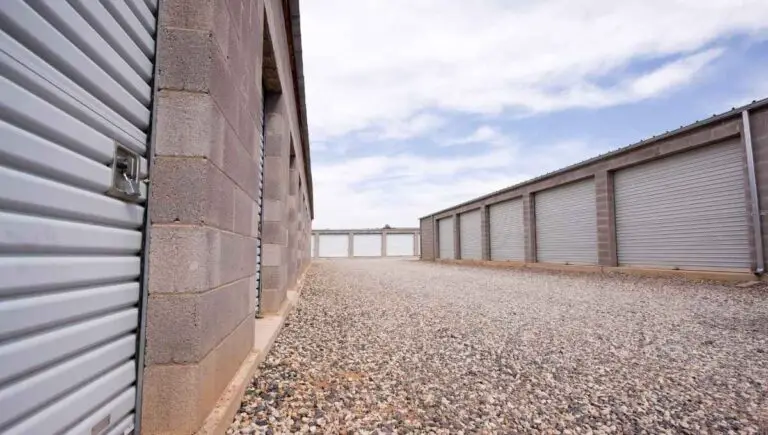Can I Put a Pool in My Basement? (What to Consider First)

Whether you live somewhere too cold to consider an outdoor pool, or if you just like the idea of being able to take a dip without anyone seeing you in your bathing suit, you may have considered installing a pool inside your house. The most important question is, can I put a pool in my basement?
It is entirely possible to install a pool in your basement. You’ll need a good concrete foundation and adequate space for the pool and equipment. You should also ensure your basement has a good filtration system for both your water and air down there.
That being said, there will always be some basements better suited for a pool than others. In this article, we’ll explore the best places to put a pool, the tools you’ll need, and how to make the indoor pool of your dreams a reality. Keep reading!
This post contains affiliate links. This means Household Blogger may earn a commission should you make a purchase using any of our links. Please refer to our full affiliate disclosure policy for full details.
Here’s a Quick Pro Tip!
If you’ve decided you need an indoor pool in your basement, don’t forget to accessorize!
Here are three of our favorite poolside accessories:
1. Chaise Lounge – Perfect for after swim relaxation, maybe with a drink?
2. Minibar – After all, who isn’t thirsty after a good swim?
3. Inflatables – Perfect for kids of all ages!
Is It Possible to Have a Pool in Your Basement?
The most important question you’ll ask yourself before starting a basement pool project is, is it even possible?
In this section, we’ll tackle that question and decide where the best spot is for your indoor pool.
Can a Swimming Pool Go in the Basement?
A swimming pool can go in the basement. Your basement needs to have a concrete floor, and you need adequate space for the pool to be installed. You’ll also need a good filtration system for both air and water.
Depending on your foundations, your basement pool can be installed above ground or even partially inground.
However, be aware that even if you already have a concrete floor for the pool’s foundation, you may need to have it leveled.
Can You Put a Swimming Pool Inside Your House?
You can put a swimming pool inside your house. You’ll want to install it in your basement, as the concrete flooring that’s most likely already in your basement is perfect for the pool.
Also, the basement is ideal for a pool because you won’t have to worry about flooding or water damage if there is a leak from the pool.
Your basement probably already has adequate drainage, just by nature of it being the basement of a house.
What Is an Indoor Pool Called?
The most straightforward term for a pool built indoors is simply an ‘indoor pool.’ However, if you want to sound fancy about it you can also refer to your pool as a ‘Natatorium.’ A natatorium is a building containing a swimming pool.
Regardless of if you decide to call your new indoor pool a natatorium, it will be a great addition to any home.
But, don’t forget you’ll need some fun activities to do while using your indoor pool. Maybe a blow-up unicorn or a peacock?
What to Consider Before Installing a Basement Pool
Whenever you’re thinking about renovating your home, you must consider some essential questions. In this section, we’ll discuss costs, materials, and permits.
Are Basement Pools Expensive?
How expensive your basement pool is will depend on your basement. A concrete basement that doesn’t need work before installing an indoor pool will cost you around $40,000. Of course, it will be more if foundations and concrete need to be poured, as well.
The good news is because indoor swimming pools aren’t outside, you don’t need to worry about building an appropriate enclosure.
This can save time and money and help keep your peace of mind.
Is a Basement Pool Worth It?
If you typically use a pool to exercise, do physical therapy, or even just enjoy a swim once in a while, a basement pool can be easily worth it. This is because they don’t get as dirty, they’re convenient, and temperature controlled.
If your basement wasn’t a functional space in your home, adding a basement pool can add value to your home.
Plus, it turns wasted space into a prime gathering spot and conversation piece. And, because you don’t have to worry about the weather, you can enjoy it anytime!
How Much Does It Cost to Install a Basement Swimming Pool?
Installing a basement swimming pool can cost anywhere from $40,000 to $100,000 depending on factors such as size, condition of the surrounding rooms, and necessary equipment.
In most cases, you’ll want to purchase a pre-fabricated pool. These are usually made from fiberglass, a durable but not overly expensive material.
While the price tag for an indoor pool is initially costly, it also adds a lot of value to your home if you eventually intend on selling.
How Much Floor Space Do I Need for a Basement Pool?
Depending on the room’s dimensions, an indoor pool will usually be between 10×20 feet to 20×40 ft. The great thing about installing a new pool is that it can be almost any size you want. Typically, a basement pool will be rectangular in size and about twice in length what they are in width.
In most cases, you’ll want your pool to be almost the same length or width as the room it will be housed in.
You will want to keep at least a foot on all sides to allow you to easily maintain the pool. If you want room for poolside accessories, you’ll need to plan for them before deciding on the pool’s size!
What Are the Indoor Pool Standards for a Ceiling?
Your indoor pool needs to have a water-resistant ceiling. Fiberglass or metal is ideal for an indoor pool ceiling because they are nonporous and will not trap humidity. A metal ceiling will act as a natural barrier for moisture and can ensure that you will not have rust or rot issues.
If you are unsure exactly what materials are legally allowed, you may want to check your local codes, rules, and regulations.
New York, for example, has an entire section designed specifically for swimming pool design standards.
What Type of Material Can I Use for an Indoor Pool?
Your indoor pool can be made of any typical pool materials. Most pools are made from concrete and lined with either fiberglass or vinyl to ensure it’s adequately waterproofed. No matter what you use, make sure it’s waterproof and durable.
It is vital that all parts of your pool are correctly waterproofed. If any water gets into your flooring or saturates your walls, mold, and mildew can grow.
Depending on where the water sat, you may not even notice that you had a mold problem until it’s grown to a big issue.
How Is a Basement Pool Installed?
A basement pool is installed on or partially built into an existing concrete floor. There will also be a pool shelf and all pertinent foundations, plumbing, and electrical work. Then the pool shell itself will be placed overtop and filled.
Unless you have experience installing pools, you’ll want to leave the work to a professional contractor.
Be sure you know what dimensions the room is, where the pool will be installed, and the size of the pool in question. The contractor may adjust the size of the pool if necessary.
Do I Need Permits to Install a Basement Pool?
While the final say on permits will come from your local and state ordinances, you should plan on needing a permit to install your new basement pool. Most cities require a permit for a pool that holds more than two feet of water.
Make sure to check with your local Home Owners Association, if appropriate, as well. You may need permits to dig, install new electrical wiring, or ensure proper zoning.
Even if you do not need a permit, it’s always better to check first!
How Long Does It Take To Install a Basement Pool?
You can expect the process of installing a basement pool to take at least two weeks and possibly up to a month or more. Installing a pool is a complex process, regardless of if it’s installed inside the home or in the yard.
It typically takes at least two weeks for a contractor to assess your basement and then do any necessary renovations, which may include raising the ceiling, for a start.
Once renovations are complete, they’ll have to dig out the spot for the pool if it’s inground. Finally, they’ll be able to install the vinyl itself.
What Type of Accessories Can I Have in a Basement Pool?
You can put all kinds of fun accessories in your basement pool such as lighting, toys, and lounge chairs. Just because you’re putting a pool inside doesn’t mean it can’t be the coolest place to hang out!
Some great new accessories you can have with your basement pool include:
Indoor Endless Pools
Whether you’re doing physical therapy or if you just want to get a good resistance workout in, you can’t go wrong with an endless pool.
Even better, you can have an endless pool in your basement, so you don’t have to worry about working out outside!
What Is an Indoor Endless Pool?
An indoor endless pool is a pool designed for exercise. You can adjust the jet settings for as much force as you feel you need, then swim without ever having to do a turn flip.
Having your endless pool built in your basement allows you easy access to your pool, no matter the weather.
They’re a great source of exercise, and they don’t have to be large to be effective because the jets allow you to use their resistance to get your workout.
Can You Put an Endless Pool in a Basement?
Your basement is the perfect spot for an endless pool. As with any other pool, you’ll need proper electrical wiring, water pipes, and finished space for the pool to sit. As long as your basement has a concrete foundation, you should be good to go!
If your basement isn’t finished, you can still have an endless pool installed. It’ll just be a longer process.
Your contractor will need to finish the basement floor and dig the proper size out for the pool before you can have it installed.
How Deep Are Endless Pools?
The depth of most pools is measured in meters. Most commonly, endless pools are one meter deep, or about 40 inches or three feet. This is deep enough for most adults to swim comfortably but stand without issue.
Because endless pools are designed more for long swim workout sessions rather than casual leisurely swimming sessions, they do not need to be too deep.
Three feet is plenty of room to keep you moving without issue.
How Long Does It Take To Build an Endless Pool?
It takes a minimum of two weeks to build an endless pool, usually even longer. Your contractor will be able to estimate how long it will take to build your pool once they have done an evaluation.
Your contractor will need to dig a spot for your pool, assuming it’s not above ground.
Then, they’ll place the foundational work, add the vinyl, and finally fill the pool and ensure everything is working correctly. All these steps take time to complete properly.
Are Endless Pools Worth It?
If you want a safe, contained pool to work out in, and you do not want to constantly turn around and swim laps, an endless pool will definitely be worth it. They’re a great way to exercise and can be built in your basement.
While it can take a few weeks or more to build an endless pool, once completed, they are convenient to have.
Not only are they great for exercise and relaxation, but they can also raise the value of your home by a considerable percentage.
How Much Does An Endless Pool Cost?
Installing an indoor endless pool will cost you around $35,000 on average. Depending on other work that will need to be done before installation, it may cost more or less. Typically, inground pools will cost more to install than aboveground pools.
Another typical cost surrounding the price of an endless pool is how much work needs to happen to allow electricity and water to reach the location of the pool.
If these lines need to be moved or installed, it may raise the price.
Can a Swim Spa Be Installed in a Basement?
You can have a swim spa or endless pool installed in a basement. Your basement will need to be finished or at least in good enough shape to handle this kind of installation. You may need to renovate the ceiling to accommodate the necessary equipment.
It’s also important to know that you have a space large enough for the pool. You may also have to have a contractor dig a spot for the pool if it’s to be installed inground.
This can be a lengthy process but well worth it for year-round pool access!
Above Ground Pools Inside
Above-ground pools can be placed anywhere on a ground level. For example, if your basement has a concrete floor, you can have an above-ground pool put in with little hassle.
This section will discuss the best way to get your above-ground pool inside your home.
Can You Put an Above-Ground Pool in Your Basement?
You can have an above-ground pool installed in your basement. You’ll need to have a concrete or otherwise solid foundation for your new pool to rest on. Your pool may need additional support, so be sure to contact a contractor before starting.
It’s important to note that just because you already have a concrete floor doesn’t mean your floor is level.
You may still need to have someone come in and level off your floor before the pool can be installed.
What Are the Disadvantages of Above-Ground Pools Inside?
As with any project, having an above-ground pool installed inside your home does come with certain disadvantages. Having an indoor pool means higher rates of moisture and humidity in your home.
Another disadvantage is that above-ground pools can be harder to maintain because it’s challenging to work on cleaning them without being inside them.
The good news is, between the pool being above ground and indoors, it’s less likely to get dirt and debris inside it!
Related Questions
How Close to My House Can I Put a Pool?
While it may make sense to you to have your pool as close to your home as possible, most states have regulations regarding how close your pool can be to your house. For example, in California, a spa or pool must be set back at least five feet from any building.
While California is used in this example, you can find this law in most major cities. Be sure to check with your local officials and your HOA (if applicable) before starting any pool building projects.
Do Pools Add Value to a Home?
Adding a pool will add value to your home if it’s installed properly and works correctly. An inground pool will add more value than an above-ground pool due to aesthetics and locations.
Be warned, however. If your pool falls into a state of disrepair, or if it has leaks or other issues, it can drag down the value of your property.
If you’re unsure if a pool is a wise investment, be sure to ask your financial advisor before building.
Is a Salt Pool Better Than Chlorine?
The biggest plus for a saltwater pool is not having the strong chemical smell you associate with chlorine. It’s also gentler on the body and has a lower maintenance cost. Unfortunately, saltwater will eventually erode your pool’s fixtures.
Ultimately, it’s up to an individual preference for which pool is better.
Chlorine lasts considerably longer and is less temperamental than saltwater for pools.
If you have a saltwater pool, expect to have to change the levels every week, which is considerably more often than if you rely on chlorine.
It’s also important to note that saltwater pools require more electricity than chlorine pools.
Final Thoughts
Whether you want an endless pool for exercise, an above-ground pool for convenience, or an inground pool for the aesthetic, having a pool in your basement can be an excellent investment.
We hope this article helped you find which pool is best for you and your home. Enjoy your new pool!










